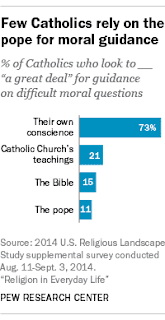The Catholic Idea of Conscience in American Presidential Elections: A Very Brief History
 |
| The results of a 2014 Pew Survey. |
But we should note that conscience language is political, not just personal. Indeed, though conscience is a crucial term in the Catholic moral imagination, invoking conscience serves a political purpose as it harmonizes candidate and constituency. Kaine portrays himself to be like any member of the faithful who uses his or her conscience to make important moral decisions. Mentions of conscience connect the Catholic candidate (or a former Catholic candidate who wants Catholic voters) to his or her Catholic base. To explore this phenomenon, it may be helpful to recall a moment, just after a divisive presidential election, when Catholic politicians joined other Catholics in invoking conscience.
The use of conscience language to mobilize a Catholic constituency has origins in the immediate aftermath of the 1968 election. Just five days after Nixon’s victory, Eugene McCarthy (the democrat’s “antiwar candidate”) and Jane Briggs Hart (a founding member of the National Organization of Women) appeared at a rally of 5,000 Catholics near the Washington Monument, where Catholics pressured their own bishops to recognize the freedom of conscience. The Bishops were gathering for their annual meeting just two days later, and some of the faithful wanted the rights of conscience affirmed in the debates about contraception and conscription. McCarthy and Hart headlined the event, joining the crowds in making the case for the importance of conscience.
 |
| From left to right: Eugene McCarthy, Jane Briggs Hart, and Rev. John Corrigan. |
McCarthy made his case for conscience not with words, but with his presence at the rally and also a donation. He was in the nation’s capital supporting the “52 Conscience Statement Priests,” a group of priests from the D.C. area who pledged to honor laypeople’s decisions of conscience on the matter of artificial birth control. Sources I found in the archive list McCarthy as a major donor to the priests’ cause. The presence of a major presidential candidate at the rally – one who had worked as a professor at a Catholic college and spent time in a monastery – must have been very encouraging for the District of Columbia priests. But McCarthy also stood to gain some cachet among Catholic voters by making an appearance. His failure to secure the nomination did not end his political ambitions. Connecting himself to a common language spoken by Catholic voters might prove useful down the line.
The other important political figure to appear at the rally was Jane Briggs Hart. Hart, active in various social movements of the era, had gained prominence in 1960 as a member of the ‘Mercury 13,’ a group of women who passed NASA’s physical tests to become astronauts. Hart helped the “Conscience Statement Priests” in a significant manner: she gave the priests money to purchase a small building, later named the Center for Christian Renewal, which the priests would use as a base of operations throughout the summer and fall of 1968. Hart spoke the conscience language directly to the American bishops. At the rally she announced a roll call of national Catholic hierarchies who backed the rights of conscience with official statements. Hart could have mentioned Canada, Australia, Germany, the Netherlands, Britain, Scandinavia, Italy, and France. She encouraged the American bishops to follow in the footsteps of their international peers in affirming the importance of following conscience. Hart was herself an important activist who would later become involved in antiwar protests and a range of other causes. But by attending and speaking at the rally, she also helped her husband, a Democratic Senator from Michigan, also a Catholic, to join in a chorus of laypeople invoking the importance of conscience. The word conscience, seemingly individualist in nature, serves a political purpose.
Notes
Carol
Kuruvilla, “On Abortion, A Surprising Number of Catholics Side With Tim Kaine,”
The Huffington Post, May 10, 2016.
Claire Gecewicz,
“Most Catholics Rely Heavily on their own Conscience For Moral Guidance,” The Pew Survey April 19, 2016.

Comments